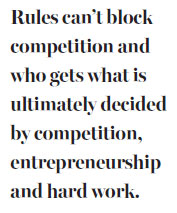Open markets: The only rules that count

Man-made edicts should promote the natural order of trade, not political objectives
The shallowness of the press can be deplorable at times. The latest example is the debate over how China can benefit from a leadership vacuum likely to be created by the incoming US President Donald Trump's global (or rather de-globalization) policies.
Partly, it's the outgoing president who is to blame. For it was Barack Obama and his aides who told the skeptical Congress, in their plea for an early confirmation of the Trans-Pacific Partnership, that if the US didn't write the rules for global trade, China would. And the US shouldn't cede its rule-making role to China.
Since the US election, never has a day passed without commentators saying, on TV or in print, how the game will change - and different countries' allegiances will change in China's favor - now that TPP is likely to be shelved by the Trump administration.

However, they are all debating politics, not trade. They don't say that who benefits most from trade, or the process of economic globalization, is not determined by who writes the rules. Rules can't block competition and who gets what is ultimately decided by competition, entrepreneurship and hard work.
Of course, there are rules and standards to follow. But they are followed only to expand trade and, more specifically, to better adapt to clients' interests and demands, not to block deals and close the door to worthy competition.
Discussing global trade from a sheer geopolitical point of view, as if it can be divided into mutually exclusive games of different political circles, can be misleading. Man-made rules should first of all work with, instead of against, the market, and not be twisted to fit one's political interests.
Even in real politics, trade sanctions can be useful only when taken as a collective action, to target a single country that is not a versatile trader in the first place.
In normal market conditions, a country can grow very rapidly as a global market player not by setting its own rules, but by taking full advantage of the existing rules. Indeed none of the rules of the WTO, the world's free trade regime, were made by China. In that game China was a latecomer. On the eve of its accession to the WTO, there were plenty of critics in China, representing a multitude of interests - from the state-owned industry to small plot-based agriculture - saying the change would spell doom for their country and the economic self-reliance it had built through many hardships.

But soon enough, China emerged as one of the greatest beneficiaries of opening up to competition and following international standards and practices.
Nor have the Chinese become so angry as to condemn other nations in, say, the annual sessions of the National People's Congress, for the loss of manufacturing jobs to Southeast Asia when Chinese wages quickly climbed.
The relocation of jobs, also in thousands, has never been seen through a geopolitical lens. Not many people, not even on populist and ideologically charged Chinese internet sites, have attributed it to an alleged national theft or foreign conspiracy. Instead, the entire country has set to work adapting to the turn of events - most importantly the decline of export orders and excessive capacity originally built for the export market - while it bears the burden of cutting pollution and using renewable energy.
This is admittedly a long and painful transition, as anyone with economic common sense is able to tell. In fact, many economists have said China is about to collapse and have been saying so for the last few years.
But the strength of China is that most of its people know the export jobs don't go away - just as they didn't come along 15 years ago - to follow the rules set by any particular government. It's the logic of the market economy at work.
By the same token, who wins or loses in the world's economic game doesn't actually depend on who writes the rules for the market - as if someone can dictate it or dominate it beyond their ability to supply needed goods and services. The winner wins only by adapting more quickly to the market's own rules.
The author is an editor-at-large of China Daily. Contact the writer at edzhang@chinadaily.com.cn
(China Daily Africa Weekly 11/25/2016 page13)
Today's Top News
- Evidence mounts of Japan's wartime atrocities
- Gunmen kill 11, wound many on Sydney beach
- Study finds Earth's deep water reservoirs
- China remembers victims of Nanjing Massacre 88 years on
- Philippines' provocations will avail it nothing: China Daily editorial
- China steps up financial support to spur consumption






























